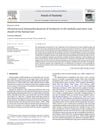April 2018 in “Veterinary Pathology” Tigers had a skin condition causing hair loss and inflammation, but the cause is unknown and treatment didn't work.
 10 citations,
September 2021 in “International Journal of Nanomedicine”
10 citations,
September 2021 in “International Journal of Nanomedicine” Tiny particles called extracellular vesicles show promise for treating skin conditions and promoting hair growth.
 26 citations,
December 2011 in “Journal of Investigative Dermatology”
26 citations,
December 2011 in “Journal of Investigative Dermatology” New gene identification techniques have improved the understanding and classification of inherited hair disorders.
 69 citations,
August 2008 in “Journal of The European Academy of Dermatology and Venereology”
69 citations,
August 2008 in “Journal of The European Academy of Dermatology and Venereology” Oral dutasteride and topical pimecrolimus can safely and effectively treat Frontal Fibrosing Alopecia, leading to significant hair regrowth.
 30 citations,
June 2021 in “British Journal of Dermatology”
30 citations,
June 2021 in “British Journal of Dermatology” Mutations in the WNT10A gene can cause skin, hair, teeth, and other disorders, and may also affect other areas like kidney and cancer, with potential for targeted treatments.
 39 citations,
July 2021 in “Stem Cell Research & Therapy”
39 citations,
July 2021 in “Stem Cell Research & Therapy” Using fat stem cells and blood cell-rich plasma together improves healing in diabetic wounds by affecting cell signaling.
11 citations,
March 2020 in “The journal of investigative dermatology/Journal of investigative dermatology” A specific group of skin stem cells was found to help maintain hair follicle cells.
 August 2024 in “Applied Sciences”
August 2024 in “Applied Sciences” Plant extracts may help prevent or reverse hair graying.
 December 2024 in “Journal of Skin and Stem Cell”
December 2024 in “Journal of Skin and Stem Cell” Trichoscopy helps diagnose and manage different types of hair loss in the Indian population.
 15 citations,
February 2017 in “International Journal of Women's Dermatology”
15 citations,
February 2017 in “International Journal of Women's Dermatology” Hair aging and loss are caused by genetics, hormones, environment, and grooming, with treatments like minoxidil effective for certain types of hair loss.
 3 citations,
July 2017 in “Elsevier eBooks”
3 citations,
July 2017 in “Elsevier eBooks” Skin reactions are a common reason for emergency visits due to drug allergies, with some severe cases needing intensive care.
 August 2024 in “Dermatology and Therapy”
August 2024 in “Dermatology and Therapy” Vorasidenib can cause unusual hair growth.
 155 citations,
August 2003 in “Journal Of Experimental Zoology Part B: Molecular And Developmental Evolution”
155 citations,
August 2003 in “Journal Of Experimental Zoology Part B: Molecular And Developmental Evolution” Understanding hair growth involves complex interactions between molecules and could help treat hair disorders.
 97 citations,
September 2016 in “Reviews in Endocrine and Metabolic Disorders”
97 citations,
September 2016 in “Reviews in Endocrine and Metabolic Disorders” The sebaceous gland has more roles than just producing sebum and contributing to acne, and new research could lead to better skin disease treatments.
 47 citations,
January 2021 in “Fertility and Sterility”
47 citations,
January 2021 in “Fertility and Sterility” COVID-19 might affect male fertility, but more research is needed to understand the full impact.
 7 citations,
December 2011 in “Annals of anatomy”
7 citations,
December 2011 in “Annals of anatomy” Involucrin helps strengthen the inner parts of human hair.
 January 2018 in “Georg Thieme Verlag eBooks”
January 2018 in “Georg Thieme Verlag eBooks” There are several educational routes to become a facial surgeon, each with different specializations and fellowships.
 273 citations,
May 2017 in “The Lancet”
273 citations,
May 2017 in “The Lancet” Some drugs can cause rare but potentially deadly skin reactions, and early treatment and avoiding the drug again are key.
 21 citations,
April 2019 in “Endocrinology and Metabolism Clinics of North America”
21 citations,
April 2019 in “Endocrinology and Metabolism Clinics of North America” Transgender patients need proper skin care, especially when undergoing hormone treatments, to manage issues like acne and hair loss.
 151 citations,
February 2007 in “International Journal of Dermatology”
151 citations,
February 2007 in “International Journal of Dermatology” Alopecia areata causes hair loss, has no cure, and various treatments exist.
 105 citations,
February 2017 in “British Journal of Dermatology”
105 citations,
February 2017 in “British Journal of Dermatology” Survivors of Stevens-Johnson syndrome/toxic epidermal necrolysis need ongoing care for various long-term health problems.
 1 citations,
August 2023 in “The Journal of Pathology”
1 citations,
August 2023 in “The Journal of Pathology” Different types of skin fibroblasts have unique roles in skin health and disease.
 73 citations,
January 1997 in “British Journal of Ophthalmology”
73 citations,
January 1997 in “British Journal of Ophthalmology” The coronal approach is effective and safe for reducing eye bulging in Graves' eye disease.
 April 2024 in “Pharmaceuticals”
April 2024 in “Pharmaceuticals” Bimatoprost helps with hair growth and eye conditions but can be costly and have side effects.
 January 2016 in “Springer eBooks”
January 2016 in “Springer eBooks” A 19-year-old male with delayed puberty was successfully treated for a condition that prevents normal hormone production.
 January 2014 in “Side effects of drugs annual”
January 2014 in “Side effects of drugs annual” Exposure to certain sex hormones can increase health risks, while some hormone therapies may offer benefits for specific conditions.
 31 citations,
January 2017 in “Advances in Experimental Medicine and Biology”
31 citations,
January 2017 in “Advances in Experimental Medicine and Biology” Low testosterone and 5α-reductase inhibitors can harm men's metabolic and sexual health; testosterone therapy may help, but discussing 5α-RIs' side effects is important.
 January 2017 in “Clinical approaches and procedures in cosmetic dermatology”
January 2017 in “Clinical approaches and procedures in cosmetic dermatology” Men are increasingly seeking quick-result cosmetic treatments for their thicker, oilier skin and hair loss issues.
 3 citations,
August 2012 in “The American Journal of Dermatopathology”
3 citations,
August 2012 in “The American Journal of Dermatopathology” A man with a birthmark on his scalp developed hair loss that improved with treatment, but the link between the birthmark and hair loss was unclear.
 47 citations,
July 2013 in “Pharmacological Reviews”
47 citations,
July 2013 in “Pharmacological Reviews” Regenerative pharmacology, which combines drugs with regenerative medicine, shows promise for repairing damaged body parts and needs more interdisciplinary research.



























